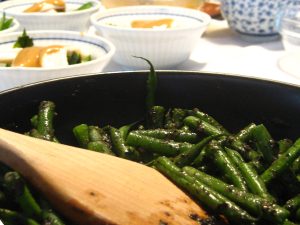September 29th was designated International Awareness of Food Waste and Loss Day. A strangely titled day that grabbed my interest because it directly related to one of the United Nations Sustainable Goals: goal 12 – to ensure ‘sustainable consumption and production patterns’. LowImpact last wrote about our food waste habit and sustainability in 2015. Back then we had some pretty stark figures, taken from a TV programme with Hugh Fearnley-Whittingstall at the time:
- £15 worth of food per week is wasted in the average UK household
- Our food waste habit costs us about 15 million tonnes of food annually in the UK, half from homes and half from agriculture and retail
- About half the food thrown away by households is perfectly edible, and almost all of the food refused or thrown away by supermarkets is edible
Why is food waste and sustainability linked?
Well, it comes down to the triple threat of pollution, biodiversity loss and climate change
We know that globally around 34% of our carbon emissions come from food, and much of that transportation. Food production globally uses 80% of water used. (Water Calculator)
These facts mean that we can’t ignore food waste. Curbing food waste and building a sustainable food network is the responsible thing to do. Put simply, our food network is incredibly unsustainable. The UK Government’s food security report 2021 states that:
The biggest medium to long term risk to the UK’s domestic production comes from climate change and other environmental pressures like soil degradation, water quality and biodiversity. Wheat yields dropped by 40% in 2020 due to heavy rainfall and droughts at bad times in the growing season.
And points out that half of the food on our plates in the UK is grown here.
Are we kicking our food waste habit?
Have we improved since 2015? WRAP – the climate action NGO sheds light on the current statistics:
- Around £13.50 worth of food is wasted each week by the average UK family
- 9.5 millions tonnes of food is thrown away in the UK – 70% of that being from homes
- Around 4.5 million tonnes of that waste is edible
These figures point to some success. Let’s explore that.
Food waste and sustainability – what has worked?
- The food and drink industry is making improvements – including efforts to pass on waste that could still be eaten through charitable donations.
- Campaigns from groups such as Wrap and Fareshare have put these issues in terms the public can understand – ensuring actions are manageable. For example, the ‘Love Food Hate Waste’ campaign from WRAP, and soundbites which compare our annual food waste to real-term examples such as ‘8 Wembley Stadiums’ worth.
- Allotment popularity and an increase in use has led to national conversations about the impact they can make, and a focus on how to encourage people to get involved.
- Linking it to cost – explaining the savings that the public can make has a big impact.
Carbon cost and the food waste habit
If food waste were a country it would be the third biggest emitter of greenhouse gasses in the world. And according to Our World In Data it is not always a straight choice of merely ‘eating local’ we need to be aware of the whole food chain. The choice of what we eat is just as vital as where our food comes from.

Slow Food
Food waste and sustainability is being tackled through building the relationship between growing and eating your own food. Local community networks are gaining strength under the term ‘slow food’; farmers markets, local small holdings, celebrating seasonal production – all connecting people with the food that they eat and how it is grown. SlowFood.org.uk aims to build a network dedicated to encouraging people to ‘appreciate what is on the plate’ and replicate the success of slow fashion movements.
And so I turn this over to you – what have you seen work in your communities? Has your household managed to kick the food waste habit? Recently started growing your own food? Let’s hear the positive stories and help others to see what is possible.








4 Comments
I have to take issue ion the subject of beef,. Clearly, American feed-lots are wasteful, destructive and uncomfortable for the cattle,. However, here we produce beef from permanent pasture, which is species-rich and harbours a lively soil microflora,. Evidence is building that the soil in this kind of system is the best thing for taking up carbon,. And whatever water the cattle drink is returned to the soil, with added N P and K, with their urine,.
Hilary. Rebecca and I were talking about this yesterday. It’s such a massive subject. we’ve been told by several people that we need to take the cattle topic off the site, because keeping cattle can’t be low-impact. But it depends on how the cattle are kept. if it’s a local, organic, mixed smallholding, with a few cattle grazing under orchard trees, completely grass-fed, with manure used on gardens / arable fields, that’s a different world from intensive north american factory-farms or brazilian beef extensively raised on ex rainforest land. I always argue that it’s about scale, as wild herds of large herbivores are largely gone – so at least some cattle can be kept without damage, surely – although overall consumption has to fall drastically. I’ve just bought Monbiot’s ‘Regenesis’, but he seems to be against all animal agriculture, including just a few on organic smallholdings. He prefers factory-produced proteins, which would (probably?) be corporate and kill local agriculture. I’m most interested in building the ‘commons’ economy (as behaviour change won’t be anywhere near enough in this system), built around local, small-scale provision of the essentials of life. I’m not interested in telling people running organic, mixed smallholdings for local markets what they should and shouldn’t produce. I want to remove barriers to small-scale, local production, not erect them.
Dave, I agree with you in as much as the subject is food waste and cattle is a large part of that food waste in the parts of the world where the consumption of bovines / cattle being the . . . . . er . . . . . zenith of that consumption [as in those places where they don’t get to eat cattle on a weekly basis (even the minimal amounts, comparatively speaking like burgers, which it seems are more rusk than anything else) they would like to! ] Thus I don’t see how we can be honest with ourselves if we remove one of the largest souces of that waste (OK then THE largest – I’m being nice to cattle) from the scale. They must be retained to indicate who is at the top of the heap as we do with bananas to show where the smallest amount of waste is . . . . . . most would be surprised how much of the banana and how it is used!
Having said that to a certain extent I agree with Hilary in pointing out the BIG differences between the American method of large herds (there again they do have large fields) and most of the European [continent NOT political] style of relatively small cattle herds (a lot consist of herds of one or two – is that a herd?] Kept in a different style (in smaller fields). However I must reiterate that the subject is waste [in general] NOT how the animals are kept but I can most certainly see where she (or is she a he? I’m never sure with these “suits everybody style of names” be they male or female and all branches of those two)
That will do for now before I wander off on my own – oh yes and as usual I open my emails far to late to be of much use really – note ot self – must read emails earlier.
The Walrus
There are lots of good points here – The manner in how animals are kept is such a big topic, and worth a whole new discussion. There can be no doubt though that beef seems to have a huge carbon footprint. If we really are going to continue to eat like this, then at the very least we can stop wasting what we grow!